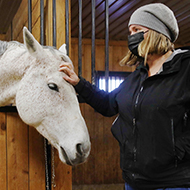Equine vets 'at risk of overwork and burnout'

Ashley hopes the findings will promote action within the equine industry to protect the mental health and wellbeing of its community.
Equine vets could be at risk of overwork and burnout as they manage their responsibility to protect public health in emergencies, new research suggests.
The study by Scotland’s Rural College (SRUC) examined how the challenges of COVID-19 impacted equine vets, horse owners, farriers and welfare centre managers.
To understand how the pandemic affected different groups, the researchers interviewed 22 members of the equestrian community in Aberdeenshire and two welfare centre managers in England.
Their findings show that the mental health and wellbeing of vets and horse owners were negatively affected during the pandemic, with obstacles to communication and limitations on horse–owner interactions being significant sources of distress and frustration.
However, the study does highlight several positive outcomes for wellbeing during the pandemic, resulting from actions by the equine community to overcome social isolation and financial pressures.
PhD student Ashley Ward, who led the research, said: “From this study, we have been able to better understand the importance of human-animal interactions and the role that horses played in lessening the detrimental impacts of isolation and anxiety associated with uncertainty around lockdown.
“It is also of note that the pro-social actions undertaken by individuals to benefit the community had the potential to improve the wellbeing of those undertaking the activities - as well as the community they sought to benefit."
She added: “It is hoped that such information will promote action within the industry to protect the mental health and wellbeing of its community, using actions which combat the issues raised in this research.”



 The Veterinary Medicines Directorate (VMD) is inviting applications from veterinary students to attend a one-week extramural studies (EMS) placement in July 2026.
The Veterinary Medicines Directorate (VMD) is inviting applications from veterinary students to attend a one-week extramural studies (EMS) placement in July 2026.